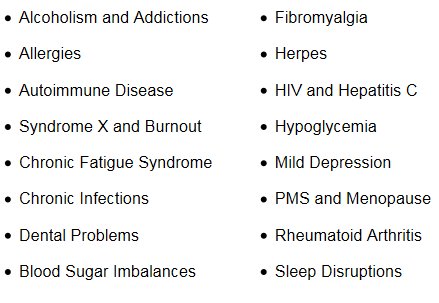|

Do you feel constantly tired, moody and depressed? Do you wake up feeling tired even
after a full night’s rest? Do you crave sugary and salty foods, and depend on your morning
coffee just to keep your eyes open?
 These are all common symptoms of adrenal fatigue -- a
condition caused, in short, by too much stress and work. It’s
estimated that up to 80 percent of adults suffer from adrenal
fatigue, yet it continues to be a largely ignored and
overlooked health problem, according to Dr. James Wilson,
author of "Adrenal Fatigue: The 21st Century Stress
Syndrome". These are all common symptoms of adrenal fatigue -- a
condition caused, in short, by too much stress and work. It’s
estimated that up to 80 percent of adults suffer from adrenal
fatigue, yet it continues to be a largely ignored and
overlooked health problem, according to Dr. James Wilson,
author of "Adrenal Fatigue: The 21st Century Stress
Syndrome".
“Adrenal fatigue can affect anyone who experiences
frequent, persistent or severe mental, emotional or physical
stress. It can also be an important contributing factor in
health conditions ranging from allergies to obesity. Despite its
prevalence in our modern world, adrenal fatigue has
generally been ignored and misunderstood by the medical
community,” Dr. Wilson writes on his Web site.
What is Adrenal Fatigue? What are the Signs and
Symptoms?
Your adrenal glands (located on top of each kidney) act as
control centers for many hormones. One of their most
important tasks is to get your body ready for the "fight or
flight" stress response, which means increasing adrenaline
and other hormones.
This response increases your heart rate and blood pressure, slows your digestion and
basically gets your body ready to face a potential threat or challenge.
While this response is good when it's needed, many of us are constantly faced with
stressors (work, environmental toxins, not enough sleep, worry, anxiety etc.) and are in
this "fight or flight" mode for far too long -- much longer than was ever intended from an
evolutionary standpoint.
The result? The adrenals become overworked and fatigued, and adrenal fatigue develops.
If you feel one or more of the following on a regular basis, you may have adrenal fatigue,
according to Dr. Wilson:

- You feel tired for no reason.
- You have trouble getting up in the morning,
- even when you go to bed at a reasonable hour.
- You are feeling rundown or overwhelmed.
- You have difficulty bouncing back from stress or illness.
- You crave salty and sweet snacks.
- You feel more awake, alert and energetic after 6PM than you do all day.
Further, when your body is overly stressed your
adrenal glands increase the production of the stress
hormone cortisol, which can alter your:
• Appetite, leading to food cravings
• Energy levels, leading to fatigue and exhaustion
• Mood, leaving you feeling emotionally drained
• Memory and learning
• Muscle mass and bone density
• Immune response
You may notice symptoms began after a single, high-stress event, or alternatively after a
prolonged period of daily stress. Either can over-stimulate your adrenals to the point of
fatigue, and anyone may be affected. However, the following factors increase your risk of
adrenal fatigue:
• Chronic illness
• Poor diet
• Too little sleep
• Too much pressure/overwork
• Substance abuse
• Repeated infections (bronchitis, pneumonia, etc.)
• Maternal adrenal fatigue during gestation
Likewise, adrenal fatigue is often associated with chronic illnesses because they also
place demands on your adrenal glands. According to Dr. Wilson, the following conditions
may either be related to, or exacerbated by, adrenal fatigue:

How to Diagnose Adrenal Fatigue
Conventional medicine typically does not acknowledge adrenal fatigue until potentially
life-threatening conditions like Cushing’s syndrome (an overproduction of cortisol) and
Addison’s disease (an underproduction of cortisol) develop. However, you can have
adrenal fatigue or an adrenal imbalance -- along with a range of debilitating symptoms --
long before you progress into one of these extremes.
A health care provider who is knowledgeable in the area of adrenal fatigue can perform a
saliva test to check your levels of cortisol over a 24-hour period. In healthy adrenal
function, cortisol should be elevated in the morning, lower and steady throughout the day,
and then should drop in the evening when you go to sleep. In people with adrenal fatigue,
however, cortisol levels remain lower throughout the day and rise in the evening when you
should be relaxing.
If you find that your adrenals are fatigued, there is help available and by following the
steps below you can restore your adrenals and regain your vim and vigor.
Five Steps for Restoring Healthy Adrenal Function
It likely took some time for your adrenals to become fatigued, and it will take some time to
nurse them back to health. And, you must commit to changing your lifestyle to be less
stressed and more restful if you want to get better. At this time, the most important thing
should be your health and you should make time for the following in that regard:
 - Get more sleep. Your body does most of its
regeneration during sleep, so whenever you feel tired,
it’s time to sleep. This includes taking naps during the
day if you can, sleeping in an extra hour or two if you’re
tired in the morning, and turning off the TV early so you
can nod off sooner.
- Revamp your diet with healthy foods. A healthy diet
focused on fresh, whole preferably organic foods will
provide your body with the strong nutrient base it
needs to function. Focus on including a protein source
in all your meals and snacks to keep your blood sugar
stable, and eat nutritious snacks between meals so
you never get overly hungry (going long periods
without eating makes your adrenal glands work
harder).
- Cut out sugar, caffeine and artificial stimulants.
When you’re tired, you may be tempted to reach for
coffee, candy, doughnuts, and other refined carbs for a
quick pick-me-up. But while these stimulants will give
you a quick boost, they’ll be followed by an even biggei
crash. Coffee can also over-stimulate your adrenals, which you want to avoid.
Instead, if you’re craving sugar or caffeine, it could be because your body is
actually tired, and you’d be better off resting than trying to get artificially
“energized.” You can also substitute healthier alternatives for sweets and
coffee, such as fresh fruit or a cup of herbal tea.
- Consider supplements for adrenal health: You may benefit from certain
high-quality supplements to help your adrenals stay healthy and return to optimal
function if they’re distressed. When choosing a supplement for your adrenal health,
look for one that supports both your immediate energy needs and long-term immune
system function, as well as comes from a reputable source like Designs for Health.
Since 1989, Designs for Health has been the health care professional's trusted
source for research-backed nutritional products of superior quality.
Driven by a "Science First" philosophy, their team of nutritionists and clinical experts
utilize both clinical feedback from leading industry pioneers, and sound, scientifically
researched literature as the basis for designing their products. Ask your health care
practitioner about Designs for Health: CatecholaCalm:
A unique formulation specially designed for the ever-increasing number of
"burned-out" anxious patients suffering from a unique combination of low cortisol
and elevated catecholamines (epinephrine and norepinephrine).
Research data suggests that, as chronic stress inevitably leads to a state of
adrenocortical exhaustion or "burn-out," a compensatory adrenal response will often
occur in the form of increased sympathetic, catecholamine activity.
Because this is becoming an increasingly more common phenomenon, it has
become necessary to employ formulations that not only optimize cortisol balance
but also optimize catecholamine imbalance.
Adrenotone:
In just one product, it is now possible to provide botanical and nutritional
enhancement of adrenal cortical and medullary function, adrenal rejuvenation,
increased hypothalamic receptor function, and address depletions common to those
suffering from the effects of chronic stress.
Adrenal Complex:
A glandular-based adrenal product that offers comprehensive support for overall
adrenal and HPA axis function. N-acetyl L-tyrosine and vitamin C were added in
order to provide critical catecholamine repletion, often necessary for those
experiencing chronic stress. This product was designed with the intention of
rejuvenating tired adrenal glands and can be used along with Designs for Health
Adrenotone™.
- Reduce stress: You simply must have adequate outlets for stress if you want your
adrenals to be healthy. First, identify the source of your stress, and if possible make
changes to eliminate it (for instance, cutting back your work hours or personal
obligations). Also be certain to take into account emotional stress from guilt,
arguments, relationship problems, unhealthy habits, etc., and work out ways to
resolve these issues.
At the same time, be generous with stress relieving activities such as long walks, hot
baths, or sitting down with a good book. Your body and mind know how to relax - you just
need to give them "permission" to do so.
After making positive lifestyle changes, most people can expect to feel improvement in
four to six months. For best results, make an appointment with a knowledgeable health
care provider who can work with you on an individualized course of lifestyle modification
and other treatment.
For more tips on how to promote healthy adrenal function and restore your energy and
health, "Adrenal Fatigue: The 21st Century Stress Syndrome" is a valuable published
resource.
"Stress is like an iceberg. We can see one-eighth of it above, but what about what's
below?"
Sources
AdrenalFatigue.org
WomentoWomen.com Eating to Support Your Adrenal Glands
WomentoWomen.com Adrenal Fatigue |




 These are all common symptoms of adrenal fatigue -- a
condition caused, in short, by too much stress and work. It’s
estimated that up to 80 percent of adults suffer from adrenal
fatigue, yet it continues to be a largely ignored and
overlooked health problem, according to Dr. James Wilson,
author of "Adrenal Fatigue: The 21st Century Stress
Syndrome".
These are all common symptoms of adrenal fatigue -- a
condition caused, in short, by too much stress and work. It’s
estimated that up to 80 percent of adults suffer from adrenal
fatigue, yet it continues to be a largely ignored and
overlooked health problem, according to Dr. James Wilson,
author of "Adrenal Fatigue: The 21st Century Stress
Syndrome".
